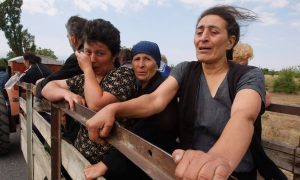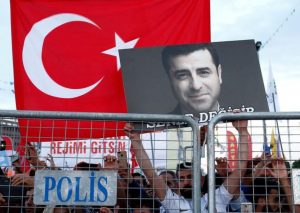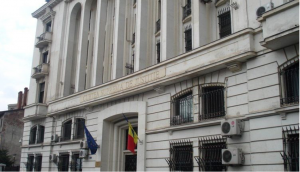By: Elizabeth Maugeri
Impunity Watch Staff Writer
MOSCOW, Russia – In January, Russian opposition leader Alexei Navalny was arrested at Sheremetyevo International Airport after returning from Germany. In August of last year, a few weeks before the Russian regional elections, Navalny fell seriously ill. He was flown from Russia to Berlin to receive treatment for what turned out to be an attempt on his life. Tests conducted on Navalny’s personal belongings found a presence of Novichok, a known Russian nerve agent.

While recovering in Germany, Navalny released a statement that announced his plan to return to Russia. The moment he stepped off the plane in Moscow, he was detained and subsequently arrested by police. He was also denied access to his lawyers.
Navalny was detained for 30 days pending trial, in which he was expected to be sentenced for violating the terms of his parole. A parole that stemmed from previous fraud and embezzlement charges that the European Court of Human Rights (ECHR) held were “arbitrary and manifestly unreasonable.” Despite the ECHR’s ruling, the Russian government sustained the charges and forced Navalny’s compliance for years. Not only do his convictions bar him from running for public office, but he must also report in person to parole services in Moscow on the Russian government’s terms.
In the case against Navalny, Russian authorities claim that he failed to report as required during the months of August 2020 through January 2021. They also assert that in some instances he failed to report on the correct day of the week.
Navalny received a 3.5-year suspended sentence for these charges but was granted time served for the time he previously spent on house arrest. He was left with 2.8-years in prison. However, Russian authorities continue to pile on other charges. Navalny now faces new criminal charges of fraud and another for allegedly disparaging a WWII veteran.
The international community has demanded the release of Navalny and considers the arrest to be politically motivated. The European Parliament presented a joint motion for a resolution regarding the arrest. The motion called out Russia for breaching its Constitution, international law, international human rights standards, and multiple international conventions. It further calls for the Council to utilize the ECHR Article 46(4) power to bring a case to the ECHR against Russia for Russia’s failure to abide by the final judgments of the Court as it has signed on to do.
Navalny has historically posed a serious challenge for Vladimir Putin and is widely considered to be the man Putin fears most. While it is expected that he will appeal his sentence, the Russian government has labeled this a domestic matter and doesn’t plan on abiding by any ruling that contradicts the decision of the country’s courts.
For further information, please see:
Politico – Collision course Moscow: The Return of Alexei Navalny – 15 Jan. 2021
Politico – Election official: Navalny can’t run for Russian president – 15 June 2017
The New York Times – Russian Activist Navalny Sentenced to More Than 2 Years in Prison – 2 Feb. 2021



